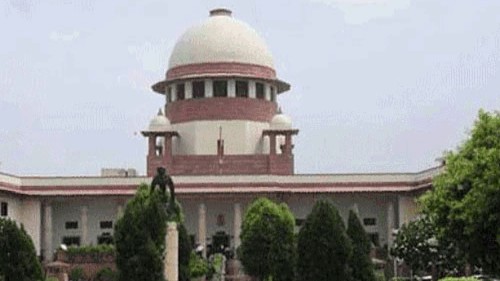
The Supreme Court of India.
PTI File Photo
New Delhi: The Supreme Court has struck down a condition mandating a convict to behave "decently" for a period of two years for remission of his life term sentence as manifestly arbitrary, saying it is too vague, subjective and violative of Article 21 of the Constitution.
A bench of Justices Abhay S Oka and Augustine George Masih said putting such a vague condition while exercising the power under sub¬section (1) of Section 432 of the CrPC will give a tool in the hands of the executive to cancel the remission at its whims and fancies.
"Therefore, such a condition is arbitrary and will be hit by Article 14 of the Constitution of India," the bench said.
The court said a convict cannot seek remission as a matter of right. However, he has a right to claim that his case for the grant of remission ought to be considered in accordance with the law and applicable policy of the government.
The court also pointed out the words ‘decent’ or ‘decently’ are not defined in the CrPC or any other cognate legislation.
"The concept of decency of each human being is likely to be different. The idea of decency keeps on changing with time. As the term ‘decency’ is not defined in the CrPC or any other cognate legislation, every person or authority may interpret the same differently. Therefore, such a condition while granting remission becomes too subjective," the bench said.
In its judgment on Monday, the bench said the decision to grant or not to grant remission has to be well informed, reasonable and fair to all concerned.
"If the conditions imposed are arbitrary, the conditions will stand vitiated due to violation of Article 14. Such arbitrary conditions may violate the convict's rights under Article 21 of the Constitution," the bench said.
Dealing with a plea by Mafabhai Motibhai Sagar, the court also clarified another condition which provided that if the appellant, after his release from jail, committed any cognisable offence or inflicted any serious injury to any citizen or property, he will be arrested again and will have to serve the remaining period of the sentence in jail.
The bench said registration of a cognizable offence against the convict, per se, is not a ground to cancel the remission order.
This condition cannot be interpreted to mean that every allegation of a breach thereof would automatically result in the cancellation of the order of remission, it added.
"A minor or a trifling breach cannot be a ground to cancel remission. There must be some material to substantiate the allegations of breach. Depending upon the seriousness and gravity thereof, action can be taken," the bench said.
The court also said the drastic power of cancelling remission cannot be exercised without following the principles of natural justice, issuance of show cause and opportunity of hearing, which is also open to challenge by the convict under Article 226 of the Constitution.
